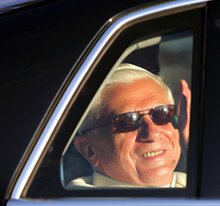Today my oldest son pointed me at an article at the National Catholic Reporter. Not one to read that magazine myself, the article immediately reminded me why I don't read the NCR. Indeed, it prompted me to write a bit of a response.
As some of you know, I am an adult convert to the Church, joining in my 30's after years of scholarly study of Islam, Judaism, and religion in general. I went on to get a degree in Systematic Theology and I read on theology almost constantly. Add in that one of my hobbies is political theory and you will soon realize that I am capable of boring a Jesuit with my interest in obscure topics and I am pretty strongly opinionated about the topics I care about.
That being said, the author, Pat Perriello, uses the pages of the NCR to completely humiliate himself by demonstrating his profound misunderstanding of the First Amendment, ethics, morals, and the teachings of the Church. The worst part is I am certain that Mr. Perriello (and some of his readers) are convinced that he has written something Important, maybe even Profound.
Mr. Perriello spends two paragraphs, one third of the total article, referring to another article and mentioning that some unspecified survey he is repeating second- or third-hand states that 79% of Americans believe that abortion should be allowed in cases of rape. He also uses that time to admit that Catholic teaching does not allow for such an exception.
Mr. Parriello's then gets to his main point, such as it is, which is nicely summed up in this quote;
"There should be a legal exception in cases of rape, incest and to protect the life of the mother, because we live in a pluralistic society."
Yes, Mr. Perriello bluntly states that the Church and Catholics should not ban abortion in cases of rape, incest and the life of the mother because people disagree with that position. How does he justify this? Why, thusly;
""Under our Constitution, our laws are not meant to impose the beliefs of one group or religion on others who don't accept those beliefs."
Sorry, Mr. Perriello, but the Constitution says no such thing. From the title of his rather short article, I assume he thinks the First Amendment's Freedom of Religion clause means that laws can't reflect beliefs held by religious people. This is the height of absurdity! The First Amendment states very simply that the government shall not have an official religion, the end. It says nothing about how people or private groups or religions can vote, what laws they can enact, etc. Of course, Mr. Perriello discusses the 'doctrine of the separation of church and state' which, of course, is never mentioned in the constitution, so I am not greatly surprised that he has no idea what the First Amendment says or means.
Further, all laws by their very nature as laws impose the beliefs of one or more groups upon others who do not agree with them! What's next, we can't pass a law saying theft is illegal because some people think theft is acceptable? Since a core concept of Jewish law is proportionality we can't have proportional punishments because that is "forcing" Judaism on others?
But Mr. Periello keeps going! He then writes;
"Some, including some of our Catholic leaders, seem to believe the church should have carte blanche to practice its religion as it chooses..."
Yes, Mr. Perriello, the Church does believe it can practice its religion as it sees fit, as do Baptists, Mormons, Sufis and everyone else who actually understands what the First Amendment means!
Mr. Perriello seems to think that since Catholic doctrine allows no exception for the prohibition on abortion all such laws are inherently Catholic. First, sharing traits does not make two positions identical. After all, as I mentioned before, theft is illegal is Judaic and Sharia laws does that make laws against theft inherently Jewish or Muslim? Second, many non-Catholic (including some atheists) support a total ban on abortion with no exceptions - does that mean that the laws are now also atheistic laws, too? Does Mr. Perriello really mean to imply that the only acceptable legal morals are atheistic morals?
My final point is about the fifth paragraph; in it Mr. Perriello attempts to draw an equivalence between opposition to what has been called Obamacare and a ban on abortion. He seems unable to understand the distinction between not wanting the government to force you to purchase something against your will and a ban on willful murder. In the one case a person wants to choose an insurance plan on their own; in the other a person is attempting to protect an innocent life from being ended by violence. While this seems clearly different to any reasonable person, Mr. Perriello seems not to grasp the gulf that separates them.
Overall, I found this piece painful to read and am appalled that any online magazine with an editorial staff would allow it to be published. And I am deeply saddened that NCR, whcih claims to be Catholic, did so.
Subscribe to:
Post Comments (Atom)

No comments:
Post a Comment